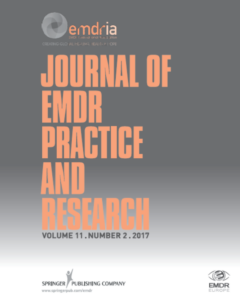Psychological and brain connectivity changes following trauma-focused CBT and EMDR treatment in single-episode PTSD patients (Frontiers in Psychology)
Neuroimaging data suggest a similar clinical improvement following EMDR and TF-CBT, with changes of bilateral temporal pole connectivity.
Read MoreIn the News: Brains That Learn Not to Fear
EMDR therapy is featured in these recent Nature journal articles discussing new findings on brain mechanisms of fear extinction. Learn more in this edition of In the News.
Read MoreFear extinction learning improvement in PTSD after EMDR therapy: an fMRI study (European Journal of Psychotraumatology)
Participants underwent a behavioural fear conditioning and extinction paradigm during functional magnetic resonance (fMRI).
Read MoreNeurobiological foundations of EMDR therapy (Springer, 2019)
Marco Pagani and Livia Sani describe the neurobiology of PTSD and brain areas affected pre and post EMDR treatment in EEG imaging.
Read MoreChildhood Abuse, Brain Development and Psychopathology
Childhood maltreatment is an important preventable risk factor for psychiatric disorders. Explore the effects of maltreatment on the brain.
Read MoreThe Art and Science of Resilience: The Role of Mindful Compassion, Empathy, and Interpersonal Neurobiology
Learn skills, both yourself and clients, that promote positive empathy, and mindfulness, that lead to increased resilience and happiness.
Read MoreEye-movement intervention enhances extinction via amygdala deactivation (Journal of Neuroscience)
This article “demonstrates that goal-directed eye-movements, like working-memory tasks, deactivate the amygdala, the core neural substrate of fear learning.”
Read MoreEye movement desensitization and reprocessing as a treatment for PTSD: current neurobiological theories and a new hypothesis (Annals of the New York Academy of Science)
Theories on EMDR’s mechanisms of action involving working memory, interhemispheric communication, de-arousal & memory reconsolidation.
Read MoreImpact neurobiologique de l’EMDR dans le cancer (Journal of EMDR Practice and Research)
L’exposition à une maladie mortelle comme le cancer peut constituer une expérience traumatique qui dans certains cas peut conduire au …
Read MoreMetabolic and Electrophysiological Changes Associated to Clinical Improvement in Two Severely Traumatized Subjects Treated With EMDR-A Pilot Study (Frontiers in Psychology)
EMDR showed clinical improvement in PTSD symptoms associated with metabolic & electrophysiological changes in limbic and associative cortex.
Read More





